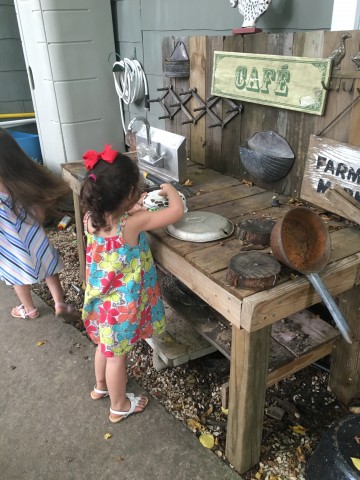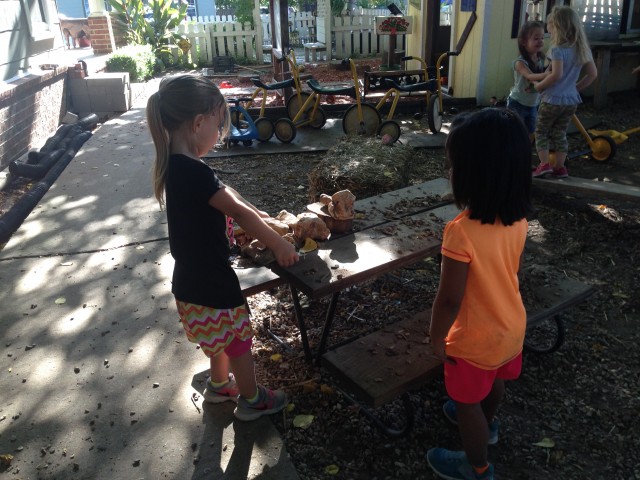The Mud Kitchen is Open
The Mud Kitchen is Open
Today we opened the Mud Kitchen . Ms Dallas does the outside time so she introduced the Mud Kitchen and how we use it. We don’t tell them ” what ” to make we just set a few guidelines to keep them safe and to respect other people that want to use the mud kitchen. Some things you might want to know she covered are :
Where does the mud go ? ( We try hard to keep the sand in the sand container and not mix the two. Yes, there is value in mixing sand and mud but neither is free . In our ten days of school so far we have already almost completely used two bags of sand. It will get better, we are learning ! But not mixing the sand and the mud helps it to stretch farther.



We have tools to use with the mud. We have small vs big spoons. We have round and square pans and we have tall and short pitchers.
They talked about how much dirt to use and how long it should cook. They all agreed they should cook it until 10 so they counted to 10.
We learned that we can have lots of fun at the mud kitchen but when we decide to leave we have to clean up our mess. We put our mud back in the mud pot . We put our tools back on the tool shelf. When the bell rings we wash the dishes using the water we have in the kitchen area so they will be ready to use the next day.
You can see there is so much learning that takes place in the mud kitchen. There is math , science and language !
If you want to read more of the benefits a mud kitchen offers –
From the web page abcdoes.com :
These are some of the skills that I came up with that children could learn and consolidate through mud kitchen
play.
Development of Pretence – Children developing the capacity to use their imagination to feed their play.
Development and use of receptive and expressive language – Children’s ability to listen to and understand what is being said to them and also their ability to communicate their ideas and thoughts is a way that others can understand.
Mental representations – ideas that children create in their mind and then play out through role play and interaction
Transform objects – Children use their imagination to turn one object into another. The more ambiguous the object, the easier the process. So a box can be a boat, a house, a microwave a shoe etc
Symbolic action – children imagine how something might ‘be’ or ‘feel’ and then use this as a mechanism for their play.
Interactive dialogue – Children talk to others who respond appropriately
Negotiation – Using language and conversation skills to reach a compromise or end result.
Role taking through choice – Children coorperate in play but decide on the role within that play that they would like to take. Often done without talk
Role taking under direction (cooperation) – Children cooperate in play but are happy to be directed by another child or adult who is leading the scenario
Improvisation – Children have no set or fixed plan for how their play will develop. The scenario emerges as a result of the children’s interactions.
Luca 1
Cognitive Strategies
Joint Planning – Children work together to come up with a plan
Negotiation – Joint discussions that lead to an agreed end result
Problem Solving – taking time to think together or alone to solve a problem or issue
Goal Seeking – Children will work individually or in collaboration to seek and end result
Emotion – Children can explore a range of emotions in a safe and supported environment
Cognition – Children acquire new knowledge through language, interaction and experience
Language – Children can extend their range of vocabulary as well as mechanisms for using and expressing language.
Sensory Motor Actions – Children make sense of the world through their senses and physical actions
Abstract Thinking – Thinking about the world around them in a different way. For good abstract thinking, children need to be able to use and apply their prior knowledge uniquely.
Explicit Rules – Children learn about explicit rules like playing fairly and sharing
Implicit Rules – Children learn about more complex and subtle rules that exist with play like engaging others in their play and maintaining fantasy play, even though they know that it is not ‘real’.
